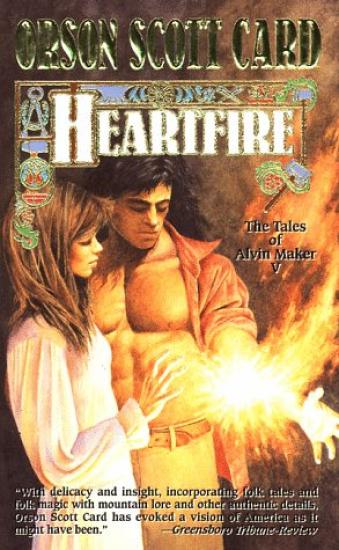
Series: Book 5 in the Tales of Alvin Maker series
Rating: **
Tags: EN-Fantasy, Lang:en
Summary
This is the fifth novel in Orson Scott Card's popular
Alvin the Maker series, based on an alternate America where
some people are born with
knacks, which resemble magical abilities. The
protagonist of the series, Alvin, is a
maker who not only can fix things (such as restoring
a wounded bird to health with his doodlebug) but is also
something of a natural leader. Alvin and his small band of
followers are on a quest to build the Crystal City, a place
where those who have knacks can live in safety from the
people who sometimes burn them as witches. While Alvin visits
the nearly holy province of New England to find out just how
cities work, his wife Margaret, traveling under the name
Peggy, journeys to the kingdom of Camelot, which was formerly
known as Charleston, South Carolina. There she hopes to
persuade the exiled King Arthur to help her abolish the
practice of slavery. Heartfire is an excellent midseries
novel that's sure to delight fans of Alvin.
--Craig E. Engler
Fifth in Hugo and Nebula winner Card's immensely popular
Tales of Alvin Maker, this installment of alternative
American history centers around two grievous social wrongs.
Arthur Stuart, exiled King of England, reigns in Camelot
(Charleston), capital of the slaveholding southern Crown
Colonies; in New England, meanwhile, "witchers" connive to
execute anyone with the "knack," the ability to connect to
the powers of the universe. Just before civil war erupts,
telekinetic Alvin and his historical friends, such as John
James Audubon, and legendary ones, such as riverman Mike
Fink, set about to abolish New England's antiwitch laws,
while Alvin's wife and mentor, Margaret, uses her ability to
read human souls to offer the hope of freedom to the
Colonies' slaves and to heal Alvin's malevolent brother
before he can kill her husband. Card's antebellum settings,
dialogue and historical figures seem authentic and thoroughly
researched, and, as always, he offers excellent
differentiation of characters. However, Card is as
occasionally windy and preachy as ever, and the plethora of
lengthy philosophical and/or psychological digressions make
for considerably less fictional sizzle than fizzle. Consider
this a good bet for fans of the series, but not for a wider
readership.
Amazon.com Review
From Publishers Weekly
Copyright 1998 Reed Business Information, Inc.